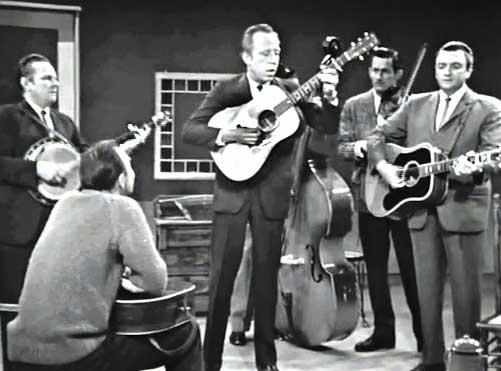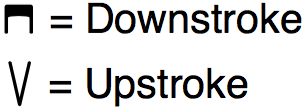Country & Bluegrass Crosspicking
Definition: Crosspicking is a technique for playing the guitar or mandolin that involves using a flatpick to pick a group of three or more strings in a pattern that repeats. The crosspicking style is best known as an element of the flatpicking style in bluegrass music, and when played on guitar, it sounds very similar to the “rolls” that you hear from a banjo player. Crosspicking is essentially the guitar version of the fingerpicked banjo roll.
Popular Bluegrass Crosspicking Songs
There are several crosspicking songs that you’ll hear at bluegrass jams all the time. Learn how to play some of the best songs for bluegrass crosspicking with our crosspicking guitar lesson videos. Each crosspicking guitar lesson comes with a complete lesson video and guitar tablature.
Crosspicking History
Crosspicking was introduced on acoustic guitar in the 1950s by Stanley Brothers guitarist George Shuffler. Shuffler developed this technique to use for playing backup fills and lead guitar. Other well-known crosspickers in the bluegrass genre include Doc Watson, Clarence White, and Tony Rice.

Traditional Bluegrass Crosspicking
A traditional bluegrass crosspicking pattern is based on groups of three eighth notes. In 4/4 time, one measure consists of eight eighth notes, and as a result, three-note crosspicking patterns don’t fit evenly into a 4/4 measure. To build a complete one-measure pattern, guitarists often pick through a three-note grouping twice and then add two more eighth notes on the end. A common crosspicking pattern over a C major chord, by string number, would be 4-3-2, 4-3-2, 4-2.
Forward Roll vs. Backward Roll
Guitar and mandolin players in bluegrass typically use two primary crosspicking patterns — the forward roll and the backward (reverse) roll. A forward roll is when you pick across a group of strings from lowest to highest in pitch. Many would consider a three-note forward roll to be the most common crosspicking pattern used in bluegrass music. A backward roll is when you pick across a group of strings from highest to lowest in pitch. Practice your forward and reverse crosspicking rolls on guitar over a basic bluegrass progression using two examples tabbed out below.
Forward Roll Bluegrass Progression

Backward Roll Bluegrass Progression

Pick Direction
The direction you pick the strings when crosspicking a standard three-note roll is a personal preference. Many guitar players prefer a down-down-up, down-down-up, down-up pattern. This method closely mimics the traditional banjo roll. The other common technique is a strict alternate picking pattern of down-up-down, up-down-up, down-up.
These two picking patterns have a slightly different feel to them — the “down-down-up” pattern sounds fairly smooth and fluid while the alternate picking pattern tends to sound a bit more dynamic as each downstroke and an upstroke produces a slightly different tone. Try out each of the practice progressions below and see if you can tell a difference in sound.
Pick Direction Key

Forward Roll #1 → Down-Down-Up, Down-Down-Up, Down-Up

Forward Roll #2 → Alternate Picking

Backward Roll #1 → Down-Up-Up, Down-Up-Up, Down-Up

Backward Roll #2 → Alternate Picking

